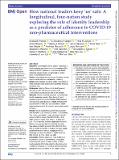How national leaders keep ‘us’ safe : a longitudinal, four-nation study exploring the role of identity leadership as a predictor of adherence to COVID-19 non-pharmaceutical interventions
Abstract
Objectives : To investigate whether citizens’ adherence to health-protective non-pharmaceutical interventions (NPIs) during the COVID-19 pandemic is predicted by identity leadership, wherein leaders are perceived to create a sense of shared national identity. Design : Observational two-wave study. Hypotheses testing was conducted with structural equation modelling. Setting : Data collection during the COVID-19 pandemic in China, Germany, Israel and the USA in April/May 2020 and four weeks later. Participants : Adults in China (n=548, 66.6% women), Germany (n=182, 78% women), Israel (n=198, 51.0% women) and the USA (n=108, 58.3% women). Measures : Identity leadership (assessed by the four-item Identity Leadership Inventory Short-Form) at Time 1, perceived shared national identification (PSNI; assessed with four items) and adherence to health-protective NPIs (assessed with 10 items that describe different health-protective interventions; for example, wearing face masks) at Time 2. Results : Identity leadership was positively associated with PSNI (95% CI 0.11 to 0.30, p<0.001) in all countries. This, in turn, was related to more adherence to health-protective NPIs in all countries (95% CI 0.03 to 0.36, 0.001≤p≤0.017) except Israel (95% CI −0.03 to 0.27, p=0.119). In Germany, the more people saw Chancellor Merkel as engaging in identity leadership, the more they adhered to health-protective NPIs (95% CI 0.04 to 0.18, p=0.002). In the USA, in contrast, the more people perceived President Trump as engaging in identity leadership, the less they adhered to health-protective NPIs (95% CI −0.17 to −0.04, p=0.002). Conclusions : National leaders can make a difference by promoting a sense of shared identity among their citizens because people are more inclined to follow health-protective NPIs to the extent that they feel part of a united ‘us’. However, the content of identity leadership (perceptions of what it means to be a nation’s citizen) is essential, because this can also encourage people to disregard such recommendations.
Citation
Frenzel , S B , Haslam , S A , Junker , N M , Bolatov , A , Erkens , V A , Häusser , J A , Kark , R , Meyer , I , Mojzisch , A , Monzani , L , Reicher , S D , Samekin , A , Schuh , S C , Steffens , N K , Sultanova , L , Van Dijk , D , van Zyl , L E & van Dick , R 2022 , ' How national leaders keep ‘us’ safe : a longitudinal, four-nation study exploring the role of identity leadership as a predictor of adherence to COVID-19 non-pharmaceutical interventions ' , BMJ Open , vol. 12 , no. 5 , e054980 . https://doi.org/10.1136/bmjopen-2021-054980
Publication
BMJ Open
Status
Peer reviewed
ISSN
2044-6055Type
Journal article
Description
This research was supported by a grant from the German Research Foundation awarded to RvD, NMJ and JAH (DI 848/15-1 and HA 6455/4-1).Collections
Items in the St Andrews Research Repository are protected by copyright, with all rights reserved, unless otherwise indicated.
Related items
Showing items related by title, author, creator and subject.
-
Effect of free medicine distribution on health care costs in Canada over 3 years : a secondary analysis of the CLEAN meds randomized clinical trial
Persaud, Nav; Bedard, Michael; Boozary, Andrew; Glazier, Richard H; Gomes, Tara; Hwang, Stephen W; Jüni, Peter; Law, Michael R; Mamdani, Muhammad; Manns, Braden; Martin, Danielle; Morgan, Steven G; Oh, Paul; Pinto, Andrew D; Shah, Baiju R; Sullivan, Frank; Umali, Norman; Thorpe, Kevin E; Tu, Karen; Wu, Fangyun; Laupacis, Andreas; CLEAN Meds study team (2023-05-26) - Journal articleIMPORTANCE : Few interventions are proven to reduce total health care costs, and addressing cost-related nonadherence has the potential to do so. OBJECTIVE : To determine the effect of eliminating out-of-pocket medication ... -
Pädiatrische versorgungskonzepte in Europa
Weber, Martin W; Backhaus, Sophia; Chukwujama, Obiora; Fenski, Friederike; Henking, Christoph; Schatte, Laura; Aleman-Diaz, Aixa Y (2018-01-19) - Journal articleTo promote children’s health in Europe, the World Health Organization (WHO) developed the European child and adolescent health strategy 2015–2020, which is supported and will be implemented by all Member States (MS). In ... -
Arts-based approaches to promoting health in sub-Saharan Africa : a scoping review
Bunn, Christopher; Kalinga, Chisomo; Mtema, Otiyela; Abdulla, Sharifa; DIllip, Angel; Lwanda, John; Mtenga, Sally M.; Sharp, Jo; Strachan, Zoë; Gray, Cindy M. (2020-05-21) - Journal itemIntroduction Arts-based approaches to health promotion have been used widely across sub-Saharan Africa (SSA), particularly in public health responses to HIV/AIDS. Such approaches draw on deep-rooted historical traditions ...

